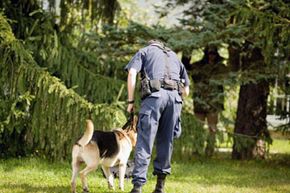Career Paths in Civilian World
An obvious transition from any military career is to a job within the government. Just as there are multiple branches of the military, there are many branches of the government, so you can find the one that fits best with your talents and interests. Something that makes ex-military particularly appealing to government employers is the possibility that you've already been granted a security clearance, as it's mandatory for many government positions. If you've already gone through the process and been cleared, you're more appealing than someone without top secret clearance applying for the same position, because the government won't have to spend the time and money to clear you.
Another logical fit is a career with the police, fire rescue or other security force. Positions like these will make use of your basic combat training received through the Army. Your experience performing as a cohort, reporting to a higher ranking officer and performing under extremely pressure-filled situations will make you a shoo-in for any of these public service positions.
Advertisement
Government and public service jobs aside, you'd probably be surprised to learn the vast variety of jobs the Army offers. Common positions are in medicine, mechanical and electrical engineering, communications and surveillance, and aviation and transportation. But did you know you could join the Army as a photographer? Or receive Army training for graphic design? You can also gain specialized knowledge in information technology or even construction [source: GoArmy.com]. Of course, being assigned to a specialized field like one of these is not a guarantee. Speak with your recruiter about your interest and demonstrated skills or potential in the field of study to fully understand how likely you are to be placed in one of these types of jobs.
Finally, regardless of your specific training, the Army teaches you valuable people and project management skills that can make you successful in any civilian position. You just have to know how to work your resume to show them off. Remember that someone who has never served in the military will not understand what Basic Combat Training is. Explain on your resume, and further in person, what you learned through your Basic Combat Training and how it is specifically relevant to the position you're applying for.
Related Articles
- Fact or Fiction: Army Medical Specialties
- How Becoming a Doctor in the Army Works
- How the U.S. Army Works
- Top 5 Gadgets on the High-tech Soldier
- Do gamers make good soldiers?
- How the Army Nurse Corps Works
Sources
- "Benefits." GoArmy.com. (April 7, 2011)http://www.goarmy.com/benefits/money/special-pay-for-special-duties-and-skills.html
- "Careers and Jobs." GoArmy.com. (April 7, 2011)http://www.goarmy.com/careers-and-jobs.html
- "Compensation." GoArmy.com. (April 7, 2011)http://www.goarmy.com/benefits/total-compensation.html
- Dillon, C. Hall. "Military Training for Civilian Careers." Bureau of Labor Statistics. (April 17, 2011)http://www.bls.gov/opub/ooq/2007/spring/art02.pdf
- Dyer, Phil. "Military vs. Civilian Pay." MilSPOUSE.com. 2009. (April 2011)http://www.milspouse.com/military-vs-civilian-pay.aspx
- "Enlisted Soldiers." GoArmy.com. (April 7, 2011)http://www.goarmy.com/about/service-options/enlisted-soldiers-and-officers/enlisted-soldier.html
- "Linguist Careers and Jobs." GoArmy.com. (April 7, 2011)http://www.goarmy.com/linguist/career-opportunities.html
- Powers, Rod. "What the Recruiter Never Told You." About.com. (April 7, 2011)http://usmilitary.about.com/cs/joiningup/a/recruiter5_2.htm
- "Training, Careers & Jobs." GoArmy.com (April 7, 2011)http://www.goarmy.com/about/army-training.html
